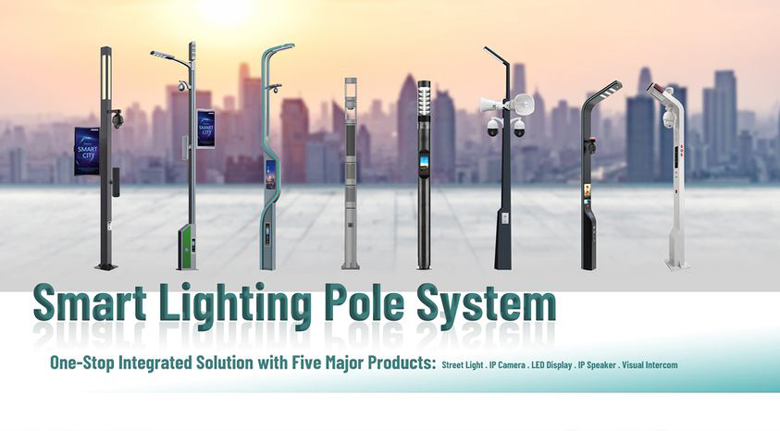

Leave a message

During the construction of smart cities, smart poles have become an important part of urban infrastructure. They not only integrate multiple functional modules but also effectively enhance the intelligent level of urban management. By integrating LED street lights, LED displays, IP cameras, environmental sensors, and other devices, smart poles provide comprehensive services and data support for the city. This article will discuss in detail the main functions of smart poles to help you better understand the value and application of this emerging infrastructure.

Smart poles are designed to integrate various functional modules, reduce redundant construction, and improve resource utilization efficiency. Each smart pole can host LED street lights, LED displays, IP cameras, environmental/air sensors, SOS emergency intercoms, Wi-Fi access points, IP speakers, mobile chargers, and charging stations. The integration of these functions enables smart poles not only to provide lighting and information dissemination but also to monitor the environment, ensure security, issue emergency alerts, and provide public internet connectivity and electric vehicle charging services.
Under the "smart city" framework,smart poles operate based on their intelligent management systems. All smart poles connect to the control room via the internet or Ethernet, supporting remote monitoring and management. This system operates on an open architecture and provides API interfaces to facilitate seamless integration and collaboration with third-party systems. This efficient management method streamlines urban management and enhances overall operational efficiency.
Smart poles have a wide range of application scenarios, covering parks, streets, scenic areas, boulevards, and other urban environments. As a comprehensive solution for upgrading urban infrastructure, they support multiple intelligent service functions. For example, smart poles can achieve smart lighting, performing remote centralized control and automatic adjustment of street lighting through intelligent design and refined management. This function not only saves energy but also automatically adjusts light intensity according to environmental changes, enhancing the intelligence of urban lighting.
In terms of communication, smart poles integrate mobile communication base station equipment and public wireless network access points, providing extensive network coverage for the city. Additionally, they support IoT communication, providing stable connections for various smart devices and promoting the intelligent development of urban management.
The security functions of smart poles are also important. By integrating surveillance cameras and smart sensing devices, smart poles can collect images and electronic information in real-time, supporting intelligent management of urban traffic, public safety, and other scenarios. These data are used not only for real-time monitoring but also to provide strong support for decision-making.
With the continuous advancement of smart city construction, smart poles are also expanding their application. Cities worldwide have begun to pilot smart pole projects, supported by policies. Relevant departments, such as China's Ministry of Industry and Information Technology and the Ministry of Housing and Urban-Rural Development, actively issue policies to guide cities in multi-pole integration construction, promoting refined urban management.
Driven by policy support and technological development, smart poles are progressing from pilot exploration to large-scale application. In the future, smart poles will continue to play a crucial role in the construction of smart cities, promoting the intelligence, refinement, and efficiency of urban management. With the development of 5G technology, smart poles will further enhance their capabilities in communication and data processing, providing more comprehensive intelligent services for the city.
In conclusion, smart poles, as key infrastructure of smart cities, enhance urban management efficiency through the integration of various functional modules and provide higher quality life services to the public. Their extensive application and continuous development will drive the city towards a more intelligent, efficient future.
 【DSPPA Demo】PAVA8000 EN54 Voice Evacuation SystemNovember 12, 2020Abstract: DSPPA PAVA8000 EN54 Voice Evacuation SystemToday, we are gonna show you a demo about our PAVA8000 EN54 Voice Evacuation System.PAVA8000EN54 Voice Evacuation System can not only support manua...view
【DSPPA Demo】PAVA8000 EN54 Voice Evacuation SystemNovember 12, 2020Abstract: DSPPA PAVA8000 EN54 Voice Evacuation SystemToday, we are gonna show you a demo about our PAVA8000 EN54 Voice Evacuation System.PAVA8000EN54 Voice Evacuation System can not only support manua...view The National Standard Approval Meeting held in BeijingJuly 19, 2019The National Standard Approval Meeting held in BeijingThe approval meeting of the National StandardTechnical standard of public address system engineeringis held in Beijing on July 16, 2019. Xue Chang...view
The National Standard Approval Meeting held in BeijingJuly 19, 2019The National Standard Approval Meeting held in BeijingThe approval meeting of the National StandardTechnical standard of public address system engineeringis held in Beijing on July 16, 2019. Xue Chang...view